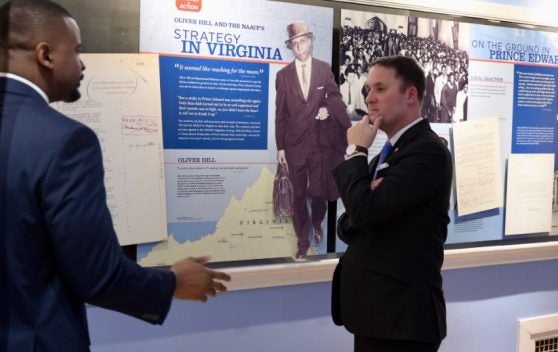Virginia Attorney General hears about local challenges in Farmville
Published 8:23 am Wednesday, February 22, 2023

- Virginia Attorney General Jason Miyares visits the Moton Museum.
|
Getting your Trinity Audio player ready...
|
FARMVILLE – In order to better do their jobs, police officers and sheriff’s deputies across this region need some help. That’s what members of local law enforcement relayed to Jason Miyares. The current Virginia Attorney General visited Farmville on Tuesday, Feb. 21.
“We’re dealing with a mental health crisis, nationally and in Virginia,” Miyares said. “(Police) have to deal with so many (Temporary Detention Orders), so many they have to transport to hospitals. Sometimes, they have to be with these individuals for hours upon hours until they can be admitted.”
Miyares said one sheriff said he’s already run through this year’s overtime budget within the first two months of the year, mainly from handling cases like this. During a discussion closed to the press, officials later told The Herald they asked for traffic stop laws to revert. In March 2021, a new state law went into effect. This new law restricts when law enforcement officers could pull over someone in a vehicle.
They are no longer allowed to do a traffic stop if the vehicle has no taillights, no brake lights or a high-mount stoplight. They can’t pull over a vehicle for heavy tint on the windows, no exhaust system or an exhaust system that is excessively noisy.
“The biggest challenge (I heard) from law enforcement is there’s been a lot of bills passed out of Richmond that have made their jobs a lot harder,” Miyares told The Herald.
Business, education leaders touch base
During his time in Farmville, Miyares also met with the president of Hampden-Sydney College, the president of Longwood University and visited FACES food pantry. The Virginia Attorney General also talked with members of the Farmville Area Chamber of Commerce, before taking a tour of the Moton Museum.
“Ultimately, I think the most important quality of a leader is to listen and that’s a lot of what I like to do, get out of Richmond and hear what (people) have to say,” Miyares said.
Speaking with Chamber members, Miyares said the number one concern he kept hearing was about rural broadband.
“Access to rural broadband is a huge issue,” Miyares said. “If you look at what attracts a business to an area, you have to be able to move data.”
Overall, Kinex Telecom Inc. is in the middle of a three-year project to bring broadband internet to Cumberland, Lunenburg and Prince Edward counties. This operation started in September 2022 and now, teams are working on both sides of US 460.
As of Wednesday, fiber had been laid and activated on Five Forks Road and Pinnock Road. If you live in the area, expect a notice to arrive soon, if it hasn’t already. The company said it sent out mailers to all families eligible for activation in the area, letting them know fiber is available. Since the project started, Kinex says 100 contracts have been signed in Cumberland, Lunenburg and Prince Edward counties.
During their meeting with Miyares, Chamber members also raised concerns about too many regulations in some areas, making it harder for them to operate.
Virginia Attorney General focuses on Moton and Barbara Johns
Beyond hearing from residents, Miyares also focused on the museum itself.
“That was a personal highlight of mine, touring the Moton Museum,” Miyares said. “I had not had the opportunity to (do this) before.”
Of specific interest to Miyares is the case of Barbara Rose Johns. Johns was a 16-year-old high school student who attended Robert Russa Moton High School. That was the first free-standing segregated high school for African-American students in Prince Edward County. Originally built in 1939, its max capacity was to hold exactly 180 students, but had over 477. As such, there was overcrowding in the classrooms, along with subpar conditions and hand-me-down education materials. Johns was one of the first students to do something about that. On April 23, 1951, she decided to lead a strike.
“When she walked out at Moton, that was four years before Rosa Parks,” Miyares said. “The bravery of a 16-year-old girl to organize a massive walkout is extraordinary.”
Miyares also set up an exhibit focused on Johns in his Richmond office. This building used to be the Hotel Richmond and now is the Barbara Johns Building.
“If you know history, the Hotel Richmond was a nerve center for “massive resistance”, it’s where the Byrd machine was run out of,” Miyares said. “It’s not lost on me that is now the Barbara Johns Building, which houses our Office of Civil Rights. But I realized from walking around the office how many employees didn’t know Barbara’s story. They knew they worked in a building named after a Civil Rights icon but they didn’t know her story. And I think her story was such a powerful one, I wanted to (share) it.”




